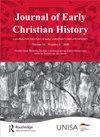Pentecostal Spirituality in Dialogue with Three Early Fathers of the Eastern Orthodox Tradition: A Question of Continuity
IF 0.1
0 RELIGION
引用次数: 1
Abstract
ABSTRACT The Pentecostal movement originated as a primitivist-restorationist movement that perceived itself in continuity with the spirituality practices of the early church, as an attempt to re-establish basic features of New Testament Christianity. The claim to stand in continuity with the early church necessitates an investigation into the spirituality presupposed by early fathers of the church. The investigation is defined by the writings of three fathers from the Eastern (Orthodox) tradition, Gregory of Nazianzus, also known as Gregory the Theologian (329–89 CE), Isaac the Syrian (of Nineveh; 613–c. 700 CE) and Symeon the New Theologian (949–1022 CE) because their writings are characterised by their interest in developing the outlines of mystical spirituality and lend themselves to a comparison with contemporary Pentecostal spirituality. Contemporary Pentecostal spiritual experiences cannot be compared with the Eastern mystical tradition because mystical experiences cannot be replicated. However, when one is exposed to the writings of the fathers until the means of expression and the spiritual experiences are understood, it seems that the experiences show enough similarities that one may speak of a revival of or a return to those kinds of experiences. Pentecostal and mystical hermeneutics seems to build its foundation upon the experiential aspect of theology; it is impossible to talk about God without the experience of fellowship with him. Worship provides the vehicle for theology, and theology serves as a commentary on the worship which has always been the central reality. The Spirit is taken as the starting point and prayer is at the heart of mystical and Pentecostal spirituality; it is impossible to know God and the things of God without prayer.五旬节精神与三位东正教早期父亲的对话:一个连续性问题
摘要五旬节运动起源于一场原始主义的恢复主义运动,它认为自己与早期教会的精神实践是连续的,试图重新确立新约基督教的基本特征。与早期教会保持连续性的主张需要对教会早期创始人所预设的精神进行调查。这项调查是由三位来自东方(东正教)传统的父亲的著作定义的,纳齐安祖斯的格雷戈里,也被称为神学家格雷戈里(公元329-89年),叙利亚人Isaac(尼尼微;公元前613年-公元前700年)和新神学家Symeon(公元前949年-公元1022年),因为他们的作品的特点是对发展神秘精神的兴趣,并有助于与当代五旬节精神进行比较。当代五旬节派的精神体验不能与东方的神秘传统相提并论,因为神秘体验是无法复制的。然而,当一个人接触到父亲的作品,直到表达方式和精神体验被理解时,这些体验似乎显示出足够的相似性,人们可以谈论这些体验的复兴或回归。五旬节派和神秘解释学似乎建立在神学的经验方面的基础上;如果没有与神相交的经验,谈论神是不可能的。崇拜为神学提供了载体,神学作为对崇拜的评论,而崇拜一直是核心现实。圣灵被视为起点,祈祷是神秘和五旬节精神的核心;不祷告是不可能认识神和神的事的。
本文章由计算机程序翻译,如有差异,请以英文原文为准。
求助全文
约1分钟内获得全文
求助全文

 求助内容:
求助内容: 应助结果提醒方式:
应助结果提醒方式:


